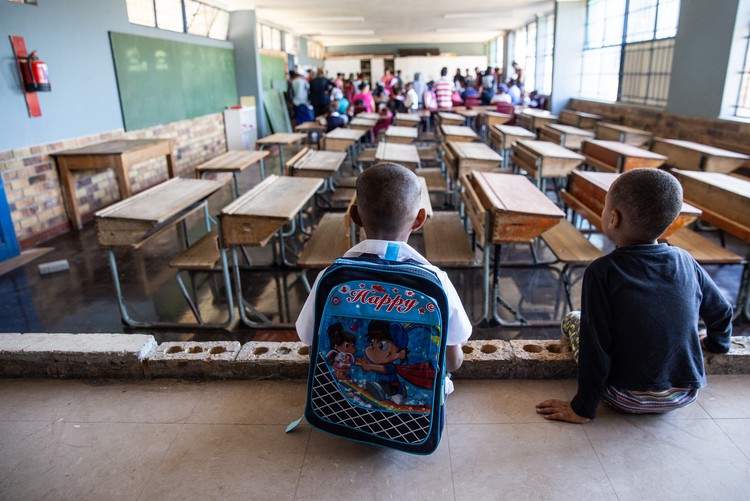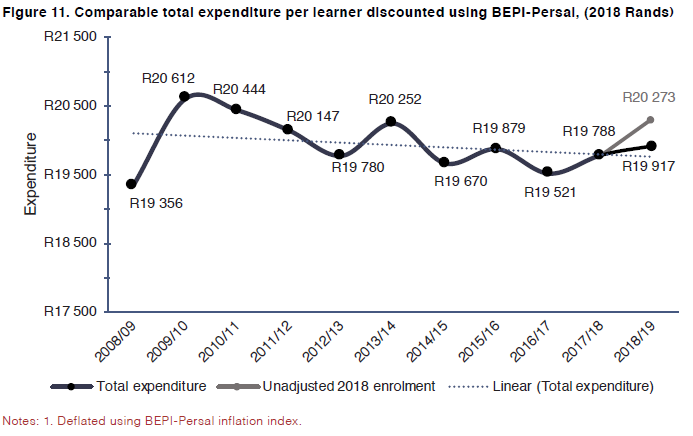Education spending is falling. The Covid-19 budget has slashed it further
Yet schools are essential to the Covid-19 response
South Africa spent R695 less per school learner in 2018 than it did in 2009 if education inflation is taken into account. Archive photo: Ashraf Hendricks
Improving our education system is key to South Africa’s development. Yet real per capita education spending has fallen over the past decade. And it has got worse with the recent budget in response to the Covid-19 pandemic.
When Minister of Finance Tito Mboweni tabled the Supplementary Budget on 24 June, the Department of Basic Education (DBE) emerged R2.1 billion poorer. Provincial education departments lost a combined amount of R1.5 billion, according to Minister of Education Angie Motshekga’s budget vote speech.
Along with these reductions, the bulk of the non-personnel basic education budget has been reprioritised to fund Covid-related measures within schools. In other words, the sector did not receive additional money to deal with the pandemic, including the need for adequate water access and clean, dignified toilets in schools, which are now more urgent than ever.
This is, in part, because Basic Education is not considered a “Covid-19 frontline department”, as reported to the parliamentary committees on Basic Education on 7 July, by the DBE’s Chief Financial Officer, Patrick Khunoe. Rather, in preparing for the Supplementary Budget, Basic Education was required to be a “donor department”, cutting its overall budget to support other “frontline” departments.
This is in contrast to the Department of Defence and the South African Police Services (SAPS), which have been defined as frontline departments and provided with a R6.7 billion injection of new funding.
While government has prioritised investments in policing the pandemic, public schools are now expected to cover their Covid-19 expenditure by cutting funding for ‘non-essential’ items.
In many cases, this is an impossible choice. Schools in Limpopo, for example, have been instructed to use up to 45% of their operational budget allocations for Covid-19 related cleaning expenses. This means schools are being forced to choose between Covid-19 essentials, such as sanitiser, cleaning, sufficient water and extra desks to ensure physical distancing, or paying the electricity bill.
Reduced education funding is a worrying trend
Slashed budgets are not new for Basic Education. In a submission to the Select and Standing Committees on Appropriations on the 2020 Adjusted Appropriations Bill, Equal Education (EE), SECTION27, and Equal Education Law Centre (EELC) pointed out that the latest cuts to basic education funding are an acceleration of a trend of the past decade.
Recently published research has found that spending on basic education per learner has reduced from R20,612 per learner in 2009/10 to R19,917 per learner in 2018/19, when the value of spending is adjusted using the Basic Education Price Index (BEPI) rather than average CPI inflation. In other words, when education sector inflation is taken into account, South Africa spent R695 less per child in 2018 than it did in 2009, with some provinces feeling this reduction more acutely than others.
Overall funding to school infrastructure, including the Education Infrastructure Grant (EIG) and the School Infrastructure Backlogs Grant (SIBG), has been cut by R1.7 billion in the supplementary budget. A further R4.4 billion of EIG funds have been re-prioritised to fund Covid-19 essentials for schools, such as sanitising and cleaning facilities and trucking water to schools.
While reducing the risk of Covid-19 infections is necessary, we are concerned that this comes at the expense of long-term solutions. The SIBG has also been cut by R60 million and many infrastructure delivery projects aimed at eradicating unlawful pit toilets, building new classrooms and upgrading old school buildings have had to be paused or cancelled. Exact information on the impact of these cuts has not been provided by the DBE, despite requests for this information from EE, EELC and SECTION27.
Real per learner expenditure on Basic Education from 2008/09 to 2018/19 (using real cost drivers from the BEPI and expressed in constant 2018 Rands). Source: Spaull et. al. (2020), The Race between Teacher Wages and the Budget: The case of South Africa 2008-2018.
Funding cuts translate into impossible choices at the school level
This year, the Northern Cape, Mpumalanga and KwaZulu Natal did not meet the minimum funding threshold of R1,466 per learner for no-fee schools. This is the amount gazetted annually by the Minister on the minimum amount of funding no-fee schools must receive to cover non-personnel budgets such as maintenance, cleaning, furniture, textbooks and other materials.
This means that in these provinces, quintile 1 to 3 schools — those in the poorest communities — cannot buy the essentials.
In response to a parliamentary question earlier this month, Minister Motshekga suggested that underfunded quintile 1 to 3 schools should start raising their own revenue by charging parents and caregivers fees. But this goes directly against the principles of equity and redress and shows Motshekga’s disregard for the dire circumstances of these schools.
Beyond Covid-19, the cuts jeopardise learners’ right to education in the long term. Historical challenges like overcrowded classrooms, unsafe school buildings and unlawful pit toilets will persist.
Schools can be part of the fight against Covid-19
That the Supplementary Budget did not allocate any additional funding to Basic Education is a failure on the part of National Treasury and others in government to acknowledge the important role of schools during this pandemic.
Schools ensure the safety and health of learners. Thanks to a recent court order secured by EE, EELC and SECTION27, the DBE and provincial education departments are now required to distribute daily meals to over nine million learners through the National School Nutrition Programme (NSNP). While this programme is critical to the health and educational outcomes of learners, it can also benefit entire households, many of which have suffered lost income during the nationwide lockdown.
As a friend of the court in our case, the Children’s Institute represented by Centre for Child Law, argued that the NSNP — as a pre-existing programme with impressive scope, reaching some of the most vulnerable households in the country — could be expanded or made “more agile” in social relief efforts during this period. For that to happen, it needs more funding.
Schools can also deliver public health messages on the pandemic. They have been sites of various public health initiatives, like the rollout of the HPV vaccine for girls, or education programmes about HIV and sexual health.
These interventions show that if Basic Education were defined as a frontline department and funded adequately, schools could help prevent the spread of Covid-19.
President Ramaphosa has committed to “build[ing] a more just and a more equal society” as we recover from this pandemic. Cuts to basic education now will not contribute to the creation of a society that is more just, or equal. On the contrary they perpetuate inequality and injustice. School interventions to deal with Covid-19 should not come at the expense of the long term realisation of the constitutional rights to basic education, equality and dignity.
Views expressed are not necessarily GroundUp’s.
Support independent journalism
Donate using Payfast

Don't miss out on the latest news
We respect your privacy, and promise we won't spam you.
Next: Twenty arrested after shops of foreign nationals looted and torched
Previous: Job cuts, lock-ins, and fear: Domestic workers suffer Covid-19 squeeze
© 2020 GroundUp. This article is licensed under a Creative Commons Attribution-NoDerivatives 4.0 International License.
You may republish this article, so long as you credit the authors and GroundUp, and do not change the text. Please include a link back to the original article.


